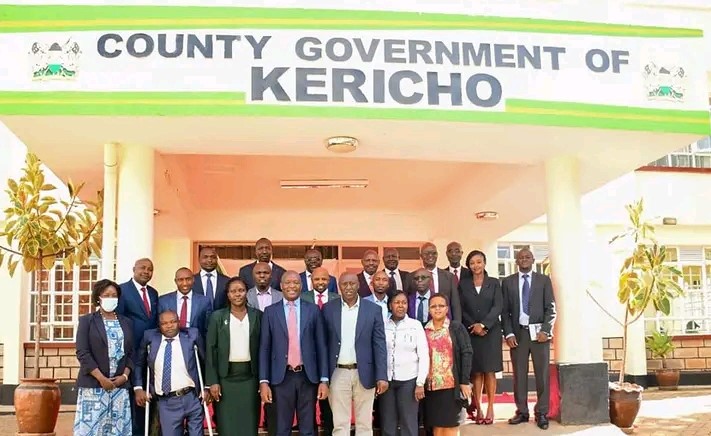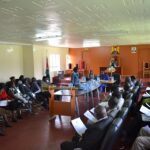Kericho County, renowned for its lush tea plantations and strategic location in the Rift Valley region, is a key contributor to Kenya’s agricultural economy. With a focus on tea production and agro-based industries, Kericho is a significant player in both local and international markets. Governor Erick Kipkoech Mutai, who took office following the 2022 elections, leads the county. His administration is committed to sustainable development, agricultural growth, and improved public services.
The county’s administrative structure includes County Executive Committee (CEC) members who play critical roles in the management and development of the region. These CECs, akin to county-level cabinet secretaries, oversee various ministries, ensuring that county policies and projects align with development objectives.
List of Kericho County Government Ministers (CECs)
Kericho County is organized into 10 ministries, each headed by a CEC. The CECs are responsible for specific sectors of governance, driving development and ensuring service delivery to the county’s residents. Here is a detailed list of the current CECs in Kericho County:
| Ministry | Minister (CEC) |
|---|---|
| 1. Public Service Management | Betsy Chebet |
| 2. Finance and Economic Planning | Leonard Kipkoech Ngetich |
| 3. Roads, Public Works, and Transport | Anderson Terer Cheruiyot |
| 4. Water, Environment, Energy, Forestry, and Natural Resources | Rosemary Chepkirui Rop |
| 5. Health Services | Ednah Chepkirui Tonui |
| 6. Information, Communication, E-Government, Youth Affairs, and Sports | Geoffrey Kipngeno Bett |
| 7. Agricultural, Livestock, and Cooperatives Management | Daniel Kipkorir Rop |
| 8. Education, Culture, Libraries, and Social Services | Richard Tonui Kibet |
| 9. Lands, Housing, and Physical Planning | Alphonce Rotich Kipkurui |
| 10. Trade, Cooperative Management, Tourism, and Wildlife | Gilbert Kipkurui Bii |
Overview of the Ministries and Their Responsibilities
- Public Service Management (Betsy Chebet)
- Betsy Chebet heads the ministry that manages human resources and public service delivery in Kericho County. Her role involves ensuring that county employees are well-equipped and motivated to provide quality services to the residents.
- Finance and Economic Planning (Leonard Kipkoech Ngetich)
- Leonard Kipkoech Ngetich oversees the county’s budget, economic planning, and resource allocation. This ministry is crucial in managing the county’s finances and guiding Kericho’s economic growth through prudent planning.
- Roads, Public Works, and Transport (Anderson Terer Cheruiyot)
- Led by Anderson Terer Cheruiyot, this ministry is responsible for constructing and maintaining the county’s road network and public infrastructure. It aims to improve connectivity within the county and support economic activities through better transport systems.
- Water, Environment, Energy, Forestry, and Natural Resources (Rosemary Chepkirui Rop)
- Rosemary Chepkirui Rop manages the county’s water resources, environmental conservation, energy initiatives, and forestry. The ministry plays a vital role in ensuring sustainable management of natural resources, addressing water scarcity, and promoting clean energy solutions.
- Health Services (Ednah Chepkirui Tonui)
- Under the leadership of Ednah Chepkirui Tonui, this ministry focuses on improving healthcare delivery and managing public health services across Kericho County. The ministry aims to enhance access to quality healthcare services in both urban and rural areas.
- Information, Communication, E-Government, Youth Affairs, and Sports (Geoffrey Kipngeno Bett)
- Geoffrey Kipngeno Bett oversees the digital transformation of county services, focusing on ICT integration and youth empowerment through sports and vocational training. His ministry aims to leverage technology to enhance service delivery and engage the youth in county development.
- Agricultural, Livestock, and Cooperatives Management (Daniel Kipkorir Rop)
- Daniel Kipkorir Rop’s ministry is pivotal to Kericho’s economy, focusing on improving agricultural practices, supporting livestock farming, and strengthening cooperative societies. The ministry’s efforts aim to boost agricultural productivity and support the livelihoods of farmers.
- Education, Culture, Libraries, and Social Services (Richard Tonui Kibet)
- Led by Richard Tonui Kibet, this ministry aims to enhance education standards, promote cultural heritage, and provide social services to the residents of Kericho County. The ministry also supports library services and community-based programs to uplift social welfare.
- Lands, Housing, and Physical Planning (Alphonce Rotich Kipkurui)
- Alphonce Rotich Kipkurui manages land use, housing projects, and urban planning in the county. His ministry ensures that land resources are utilized efficiently and that housing projects meet the growing needs of the county’s population.
- Trade, Cooperative Management, Tourism, and Wildlife (Gilbert Kipkurui Bii)
- Gilbert Kipkurui Bii focuses on promoting trade, supporting cooperative movements, and developing tourism and wildlife conservation initiatives. The ministry aims to attract investments and leverage Kericho’s tourism potential to create economic opportunities.
County Ministers (CECs) Salaries in Kenya
Like other county CECs across Kenya, Kericho’s CECs are remunerated as per the guidelines of the Salaries and Remuneration Commission (SRC). The salary structure for a CEC includes:
- Basic Salary: Ksh 242,550
- House Allowance: Ksh 45,000
- Market Adjustment: Ksh 81,700
- Total Salary Per Month: Ksh 404,250
This compensation reflects the significant responsibilities of CECs, who play an instrumental role in delivering services and driving the county’s growth agenda.
The Role of CECs in Kericho’s Development
The role of County Executive Committee members is central to achieving the goals outlined in the county’s development plans. They are responsible for ensuring that each ministry functions efficiently and addresses the needs of Kericho’s residents. The CECs work closely with Governor Erick Kipkoech Mutai, aligning their efforts with the county’s vision for a prosperous and sustainable future.
Their duties include formulating policies, implementing projects, and ensuring that the county’s resources are used effectively. By focusing on sectors such as agriculture, infrastructure, health, and education, the CECs play a vital role in fostering economic growth and improving the quality of life for the people of Kericho.
Kericho County, under the leadership of Governor Erick Kipkoech Mutai, is making strides in various sectors through the efforts of its dedicated County Executive Committee members. The CECs are at the forefront of implementing policies that drive socio-economic development and ensure the efficient delivery of public services.
As Kericho continues to leverage its agricultural strengths and natural resources, the strategic direction provided by its CECs will be crucial in achieving long-term growth and improving living standards for its residents. With a focus on sustainable development, infrastructure improvement, and social services, Kericho County is well-positioned to enhance its status as a leading county in Kenya.





